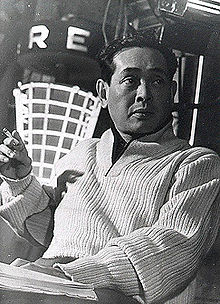
Back كيسوكي كينوشيتا Arabic كيسوكى كينوشيتا ARZ Keisuke Kinoshita Catalan Keisuke Kinoshita German Keisuke Kinoshita Spanish کیسوکه کینوشیتا Persian Keisuke Kinoshita Finnish Keisuke Kinoshita French Keisuke Kinoshita ID Keisuke Kinoshita Italian
Keisuke Kinoshita | |
|---|---|
 Keisuke Kinoshita (early 1950s) | |
| Born | Masakichi Kinoshita[1] December 5, 1912 Hamamatsu, Shizuoka Prefecture, Japan |
| Died | December 30, 1998 (aged 86) Tokyo, Japan |
| Nationality | Japanese |
| Occupations | |
| Years active | 1933–1988 |
Keisuke Kinoshita (木下 惠介, Kinoshita Keisuke, December 5, 1912 – December 30, 1998) was a Japanese film director and screenwriter.[2] While lesser-known internationally than contemporaries such as Akira Kurosawa, Kenji Mizoguchi and Yasujirō Ozu, he was a household figure in his home country, beloved by both critics and audiences from the 1940s to the 1960s. Among his best known films are Carmen Comes Home (1951), Japan's first colour feature,[3] Tragedy of Japan (1953), Twenty-Four Eyes (1954), You Were Like a Wild Chrysanthemum (1955), Times of Joy and Sorrow (1957), The Ballad of Narayama (1958), and The River Fuefuki (1960).
- ^ Cite error: The named reference
hamamatsucitywas invoked but never defined (see the help page). - ^ Ronald Bergan "A satirical eye on Japan: Keisuke Kinoshita", The Guardian, 5 January 1999.
- ^ Jacoby, Alexander (2008). A Critical Handbook of Japanese Film Directors. Stone Bridge Press. pp. 111–113. ISBN 9781933330532.
© MMXXIII Rich X Search. We shall prevail. All rights reserved. Rich X Search